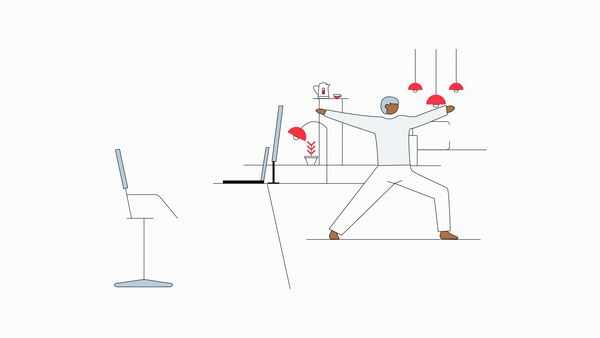← Home
AI x Design Lab
2023-present
-> Inclusive Design
-> Artificial Intelligence
-> Health Tech
-> Inclusive Design
-> Artificial Intelligence
-> Health Tech
Use of Artificial Intelligence to improve physical well-being.
This project looks at how AI can be leveraged to design inclusive digital health interventions that address lifestyle-related back pain. I used qualitative research methods, including interviews and observations, to uncover insights which directly informed design intent.

Research Overview
Back pain can happen regardless of age or ability. As we continue to adopt new modes of working (home, remote and hybrid), this presents challenges for workers to manage their back health. In the UK, the British Chiropractic Society states that 49% of people in the UK experience back or neck pain on a weekly basis, with 20% pointing to work as a key trigger.
This research aims to develop a personalised health intervention rather than general advice for backs through inclusive design research and application of AI. Read more about the research methodologies and insight in this paper (page 64).
This research aims to develop a personalised health intervention rather than general advice for backs through inclusive design research and application of AI. Read more about the research methodologies and insight in this paper (page 64).
Research Insight -> Design Intent
(1) Back pain is not just caused by posture
There is a deep-rooted perception that there is a “good posture”, typically an upright posture. We may think that back pain is only related to the straightness of the spine, but many other factors play a role.
![]()
(2) Any inclusive design intervention will have to be personalised.
Some people have spines that are more skewed or curved than others—all perfectly natural—so when it comes to giving posture advice, one size doesn’t fit all.
![]()
(3) Any effective design intervention will have to be contextual.
Back pain is not only related to sitting postures. Movement, environment, stress and even the language we use to describe pain can have an impact on back pain.
![]()
(4) Tagiblising the causes of back pain helps to make its management more actionable.
The contributors of back pain are multifaceted, the research revealed the limitation of considering static posture as the sole contributor to the narrative of back pain. The research also highlights the benefit of understanding what these factors affect back pain for people to enact change.
There is a deep-rooted perception that there is a “good posture”, typically an upright posture. We may think that back pain is only related to the straightness of the spine, but many other factors play a role.

(2) Any inclusive design intervention will have to be personalised.
Some people have spines that are more skewed or curved than others—all perfectly natural—so when it comes to giving posture advice, one size doesn’t fit all.

(3) Any effective design intervention will have to be contextual.
Back pain is not only related to sitting postures. Movement, environment, stress and even the language we use to describe pain can have an impact on back pain.

(4) Tagiblising the causes of back pain helps to make its management more actionable.
The contributors of back pain are multifaceted, the research revealed the limitation of considering static posture as the sole contributor to the narrative of back pain. The research also highlights the benefit of understanding what these factors affect back pain for people to enact change.
Disclaimer
This is an ongoing project. View the research tool developments: Conversational Data Collection Tool or Qualitative Data Collection Tool, or the design outcome: AI for Wellbeing.